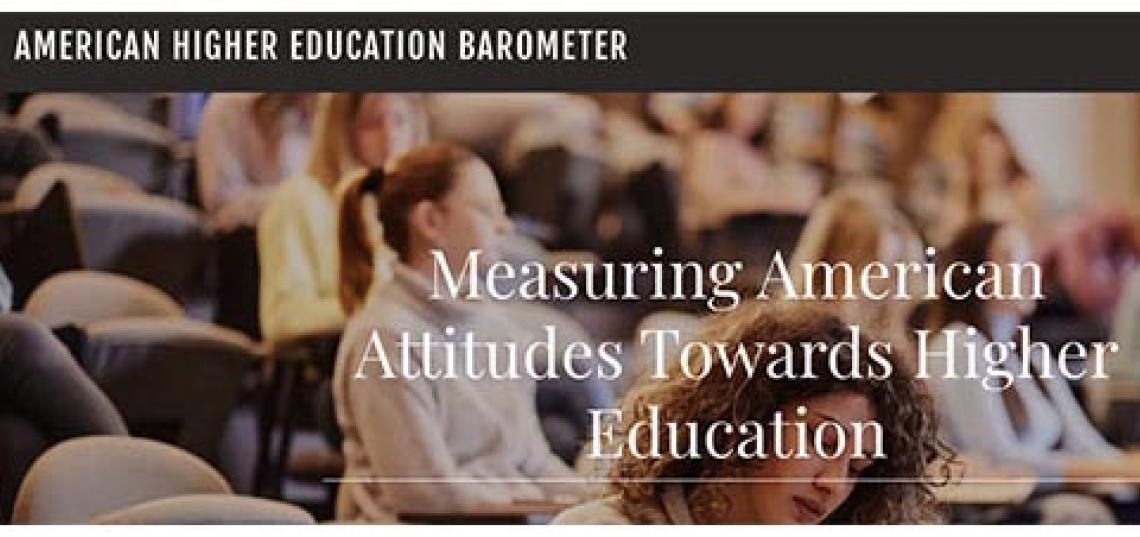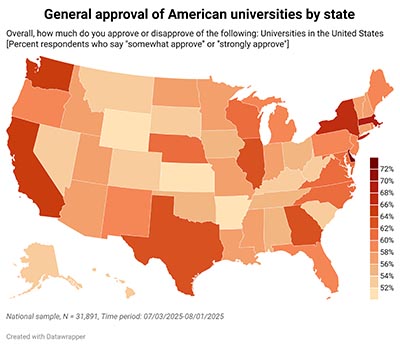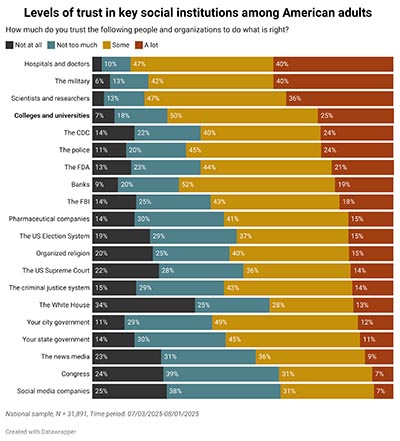
The American Public broadly supports colleges and universities; however, its support is tempered by serious concerns, according to a recent survey conducted by a new collaboration, the American Higher Education Barometer.
Launched in September 2025 by researchers from Rutgers University, Harvard University, Northeastern University, and the University of Rochester, this new research collaboration aims to conduct large-scale, 50-state public opinion data collection to identify opportunities and vulnerabilities for U.S. universities. The collaborative will share the data directly with American institutions of higher education to provide them with data showing how their strengths and vulnerabilities are viewed by the public.
Between July 3, 2025, and August 1, 2025, AHEB researchers launched their first survey, collecting a total of 31,891 responses from individuals aged 18 and older across all 50 states and the District of Columbia.
 The data found that 59% of Americans overall approve of universities, and 75% trust them at least somewhat. Most Americans recognize universities as vital for science (90%), technology (91%), healthcare (83%), and economic growth (83%).
The data found that 59% of Americans overall approve of universities, and 75% trust them at least somewhat. Most Americans recognize universities as vital for science (90%), technology (91%), healthcare (83%), and economic growth (83%).
Moreover, 72% see them as important for democracy, and majorities across parties and value their local contributions in health and the economy. This translates into strong opposition to federal funding cuts in science, health, and education, with disapproval ratios of roughly 4 or 5 to 1.
“Higher education ranks as the fourth most trusted institution in America, ahead of government, media, and most other major sectors,” said lead author and Associate Professor of Communication Katherine Ognyanova. “Combined with near-universal recognition of universities' importance for innovation and strong opposition to funding cuts, this gives university leaders significant potential for mobilization.”
The researchers also found that alumni engagement emerges as a key opportunity for institutions of higher education, as most Americans indicated they would like to learn more about threats to research funding, and nearly a quarter would write to Congress if asked by their alma mater.
Other key findings include strong opposition to policies harmful to higher education, including:
- Overwhelming public opposition to federal funding cuts
- Federal cuts to science funding: 64% oppose vs. 17% support (4:1 ratio)
- Federal cuts to health research: 70% oppose vs. 15% support (5:1 ratio)
- Federal cuts to education: 66% oppose vs. 17% support (4:1 ratio)
The survey data also revealed enormous latent possibility to mobilize support for more research investments:
- 47% of Americans surveyed want more scientific research investment in 2025 compared to 2024
- 57% want more medical research investment in 2025 compared to 2024

The report also includes recommendations that are specifically addressed to university leaders. These include ways universities could leverage their strengths by:
- Emphasizing universal values: Science (90% support), technology (91% support), and economic development (83% support).
- Mobilizing research supporters: 58% of alumni want to engage on funding threats.
- Emphasizing local community benefits (76–79% recognize local benefits of higher education).
And address their current vulnerabilities by:
- Acknowledging concerns proactively rather than dismissing them as partisan attacks, develop campus climate initiatives that address issues, and create transparent cross-stakeholder dialogue processes on free speech and campus inclusion.
- Differentiating their vulnerabilities from their strengths – that is, explaining to their audiences that the vulnerabilities have not undermined the value they provide.
At the same time, the public expressed concerns about institutions of higher education, specifically issues pertaining to cost and campus life.
For example, cost is a nearly universal concern, with 87% of Americans worried about tuition and debt, particularly among young and highly educated Individuals. These issues cut across partisan lines, though the intensity often differs.
To view the full report, see "Higher education public opinion analysis."
Learn more about the Communication Department at the Rutgers School of Communication and Information on the website.
